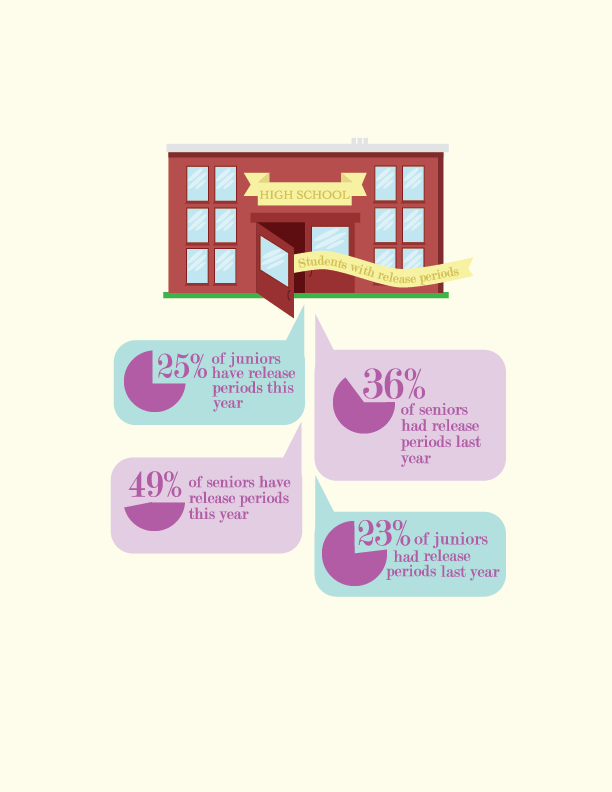Release periods: beneficial or detrimental?
Every morning, 73 juniors and 117 seniors arrive at Coppell High School about an hour later than their classmates. Every afternoon, 124 juniors and 253 seniors leave school an hour earlier.
A quarter of CHS juniors and almost half of the senior class enjoy the benefits of a release period but they also face potential consequences.
At Coppell High School, juniors and seniors can elect to take a release period during the first or last period of the day. They can also take an additional AP release if they are in advanced classes and already taking a junior or senior release or take a travel period if they are taking classes at North Lake College during the school day.
Taking a release period instead of a course at CHS has many benefits. It allows students to lighten their workload and it gives them more time to study for the classes they are taking.
“As a senior, [students] sometimes feel like it’s almost a rite of passage to take a release period,” CHS counselor John Crook said. “They can lessen their load a little bit that senior year.”
Besides academic advantages, many students, such as CHS junior Lauren Harris, take this opportunity to get an after school job.
“I get to beat the after school traffic, that’s always a plus because it’s a pain to sit through that,” Harris said. “During my seventh period release I pick up my teacher’s kids. So, it’s also an opportunity to make money.”
Other advantages include making time for other important areas of a student’s life. Having an extra hour of time to do homework gives students an extra hour of time to spend on things like extracurricular activities, community service, social activities or even just an extra hour of sleep.
“Taking a release period helps students to not be over involved [with school],” Crook said. “It’s just important to have a well-rounded life.”
Many students believe that release periods can negatively affect their college application. However, according to Crook and University of Texas admissions counselor Perri Watts, it will only have a significant impact if the release period prohibits the student from taking a sufficiently challenging course load.
Admissions counselors will look at how many courses a student was able to take versus how many they did take; but, as long as the courses that they took were rigorous and prepared them for success in college, then it will not matter if the student elected to take a release period.
“As long as you take the courses you need to be successful and that you’re interested in for your major, then you’re fine,” Watts said. “If you’re taking a release period when you could be taking AP chemistry and you want to be an engineer, then that could be a problem.”
CHS counselors are aware of this and try to direct every student toward a balanced but challenging course load.
“If you replace a release period with basket weaving then it doesn’t make a whole lot of difference,” Crook said. “But if your release period means you’re not going to take another strong course, then that’s where it makes a difference.”

Maggie Theel is 16 years old and she is a junior at Coppell High School. In addition to being a staff writer for The Sidekick, she is a diploma candidate...

Manu is the Graphics editor and Webmaster for the Sidekick Newspaper. This is her second year on staff as well as her second year with experience in graphic...














Meha Srivastav • Mar 25, 2016 at 2:09 pm
Great article!